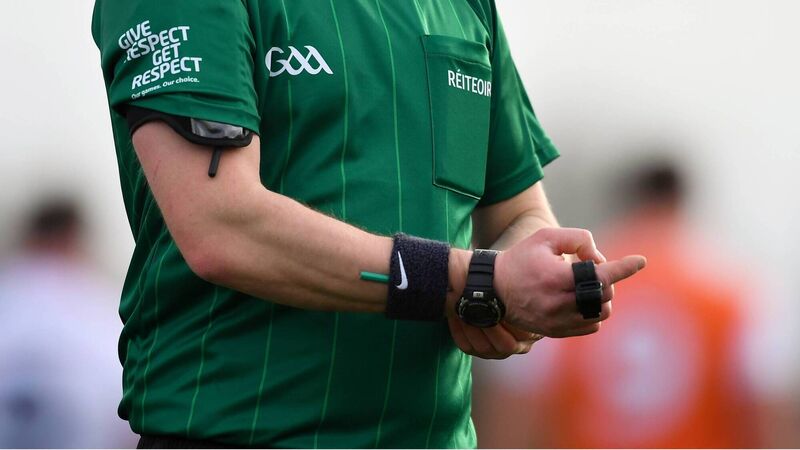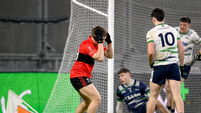It’s worth acknowledging that the debate about the future shape of the inter-county football championships which is currently . . . stirring, if not exactly raging, has achieved something I thought was downright impossible.
It has made discussion of fixture scheduling part of mainstream conversation without chloroforming listeners.
Not straightaway, at least.
I admire the earnestness of the debate from all sides, the sense that the importance of the discussion is taken as a given by its participants. Its seriousness isn’t at issue in this corner of the galaxy either — the inter-county football championship is a significant part of the Irish sporting scene, and according to some estimates I have seen in the last week, the number of games will increase significantly under the new dispensation.
For instance, Tom Parsons of the GPA said during the week: “In the existing Super 8s, it’s 66 (championship games), in the new proposed structure it’s 135 competitive games in the summer.”
Serious stuff. But there are other issues within the GAA which aren’t attracting half as much attention, but which are arguably more serious than doubling the number of inter-county football games.
For instance, should more attention be paid to the shortage of referees?
This came to my attention at a recent Cork SFC clash, between St Finbarr’s and Ilen Rovers in Ballinascarthy. The game was held up by 15 minutes as the referee dashed from a previous game — in Carrigaline, I believe — to make it down to West Cork.
That late arrival isn’t a reflection on the referee in question, but when I mentioned this to a pal living in Dublin he had a better yarn in response.
At a recent underage game played at teatime on Sunday he got chatting to the ref, who had just taken charge of his sixth game that day. And was about to move on to a seventh.
Everywhere you look, this lack of officials is having an effect. Last month in Offaly a (junior) county championship game had to be postponed because of a lack of referees, with the county board even trying to source a referee from outside the county to fulfil the fixture.
Last August, Syl Doyle in Wexford, himself a referee of some renown, said there were currently just 49 referees available for games in the county, a drop from 81 in 2016.
Go back to last December, when county board delegates in Kerry heard that the homegrown hurling referee pool was so shallow that if Causeway, Lixnaw, or Kilmoyley were playing Ballyduff, there were only two neutral referees in the county who could be called upon, and one of those worked outside the county.
There are some plausible explanations, including the impact of the pandemic on training courses and recruitment, while a case could be made that sports all over the world are struggling to develop referees — a quick Google search will prove that.
But surely we’re all adult enough to accept that the abuse of referees is one of the main impediments to recruitment in Gaelic games?
You can hardly mention this, of course, without someone saying immediately in response, ‘if only lads could conduct themselves like they do in rugby, by Jaysus one word and you’re gone, the referee is like God almighty there and fair dues, etc, etc’.
It’s as if pointing to an unacceptable, near-platonic ideal of conduct is enough to excuse the opposite standard of behaviour. As in, I can’t attain this level therefore I have carte blanche to act the maggot as a result. Which is quite the conceptual leap.
Here I have to let readers in on one of the reasons this situation has been allowed to develop the way it has.
It’s because, unlike the vexed question of just how many Super-8/provincial league/round-robin knock-out football games can be squeezed into the calendar, the referee shortage affects clubs. It doesn’t have an impact on inter-county games.
If it had, then the problem would be solved overnight.
Callum Robinson (doesn’t) answer his critics
Plenty of material incoming from the Department of Satire Is Dead over the last week or so.
We had Irish international Callum Robinson saying he wasn’t vaccinated against Covid, despite having had the disease twice already.
This was the cue for his teammate John Egan to bemoan the reaction to Robinson’s revelation saying he was “disappointed to see how many people jumped down his throat”.
Egan’s interesting metaphor was soon trumped by his manager, Stephen Kenny, who said Robinson was: “A breath of fresh air, he always comes in with a smile on his face, he’s infectious, he brings laughter to the dressing room, people love him.”
(That humming at the back of your head? That’s the pun overload mechanism at work.)
In due course, Robinson got two goals over the weekend against Azerbaijan and the headlines were predictable.
The two goals were the perfect response to his critics, or variations on that theme.
Critics?
I don’t recall a lot of people picking apart Robinson’s off-the-ball runs or his ability in the air last week, which would have counted as criticism.
I’m sure a lot of people would have been disappointed with his stance on vaccination, but the two goals weren’t the perfect response to those critics.
That would be vaccination.
A golden underage harvest
A couple of weeks ago I asked readers to pick out the underage team in their club which had provided more quality than any other, and I got some very good answers.
When Paddy Geary got in touch he made a very good case for the Blackrock minor hurling side of 1966 he was part of.
“This team was unbeaten from u-15 to minor level, winning every competition they played in, culminating in becoming county champions in 1966,” Paddy told me.
“They provided seven players to the Cork minor team panel beaten in the All-Ireland final that year — however they amassed 20 u-21 All-Ireland medals between them from 1968 to 1970.
“In addition, four won nine All-Ireland senior medals between them (Ray Cummins four, Brendan Cummins one, Pat Moylan three and Simon Murphy one).
“A fifth, Frank Norberg, captained Cork in the 1972 Senior final and won a National League medal that year.
“One of the team was selected on the Millennium Hurling Team in 2000 (Ray Cummins) and two (Ray and Pat Moylan) were multiple All-Stars.
“At club level the 1966 minor team provided nine players to the team that won the first club All-Ireland for Blackrock in 1972.”
Some record. Can anyone beat it?
Going the distance (and winning)
Many thanks to the folks in Gill Books for sending along Joe Barr’s Going The Distance , an account of his development as a world-class endurance cyclist. The Derry native’s story is a fascinating one, whether it’s almost dying from altitude sickness in the Race Across America to winning the Race Around Ireland (a 1,300-mile romp).
For this reader, the sight of a yellow Chopper was enough to produce a shudder (one crash, two knee operations). Nice work from Joe, though.











